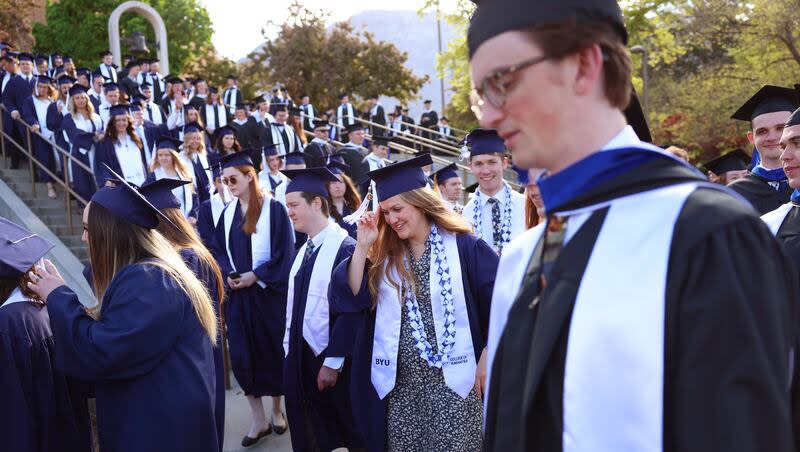Is college worth it? Here’s what this national study says

Just 1 in 4 American adults say it’s extremely or very important to have a four-year college degree to get a well-paying job in today’s economy.
Nearly one-third of U.S. adults say the cost of college is not worth it if someone has to take out loans.
These were just two of the findings of a Pew Research Center study that queried more than 5,200 U.S. adults on their views of the value of a college degree. The survey had a 2.1% margin of error.
The online survey, conducted Nov. 27 to Dec. 3, 2023, revealed stark differences in perceptions depending upon political affiliation.
According to survey results made public on Thursday, Republicans and Republican-leaning independents are more likely than Democrats and Democratic leaners to say it’s not too or not at all important to have a four-year college degree in order to get a well-paying job, which was the perception of half of the Republican and 30% of Democrats who responded to the survey.
The survey also found that it is “extremely or very likely” that someone without a four-year college degree can get a well-paying job. Forty-two percent of Republican and Republican-leaning independents agreed with that perception, as did 26% of Democrats and Democratic leaners.
Geoffrey Landward, Utah’s new Commissioner of Higher Education, during his recent confirmation hearing before a committee of the Utah Senate, extolled the “demonstrated benefits” of higher education.
“I believe that at no other time in higher education’s history have we faced such an existential crisis that higher education, long viewed as a pillar of American society and exceptionalism, is now viewed with distrust and it’s value doubted, all contrary to objective data,” Landward said.
“There isn’t a single person in this state who would not benefit from earning a certificate or degree from one of our institutions. Completion of a post-secondary credential is as valuable as ever. Postsecondary education remains strongly correlated with increased job security, lifetime earnings, civic engagement and personal health and happiness,” he said.
Rising earnings over the past decade — for those with and without college degrees — is another factor that has influenced perceptions of the value of a college degree, according to the report.
“After decades of falling wages, young U.S. workers (ages 25 to 34) without a bachelor’s degree have seen their earnings increase over the past 10 years. Their overall wealth has gone up too, and fewer are living in poverty today,” the report states.
Over the same period, economic outcomes have also improved for young college graduates.
“As a result, the gap in earnings between young adults with and without a college degree has not narrowed,” according to the study.
Survey responses also varied with respect to education attainment.
Thirty percent of college graduates said having a college degree is extremely or very important, compared to 22% of respondents with less education.
The percentage was even higher among postgraduates, with 35% responding that it is extremely or very important to have a four-year college degree in order to get a well-paying job, and 39% saying it’s more important to have a college degree today than it was 20 years ago.
Darin Brush, president of Davis Technical College, said the nation’s strong and stable economy may also play into perceptions about higher education.
“Most of our students have not lived through a period where they had to really compete for work. They only know plentiful job opportunities and that changes as we know. Resilience, in so many ways, depends on your credentials and your skills. Finishing that credential and certificate, finishing that degree we know also leads to greater resilience in the economy and longer and better attachment,” he said.
The college strongly encourages students who earn certificates and credentials to further their education at Weber State University. A student who trains to become a licensed electrician can earn a handsome living but also obtaining an associate degree would give them the skills they need to start their own successful business, Brush said.
Brush said he is a firm believer in higher education because he knows how earning undergraduate and graduate degrees opened doors in his career.
“I wouldn’t be here if I didn’t have that. I wouldn’t be in a position to do the work I’m doing if I hadn’t learned about the world and learned some things that you can only get, I fundamentally believe, you can only get through pursuit of a degree,” he said.

